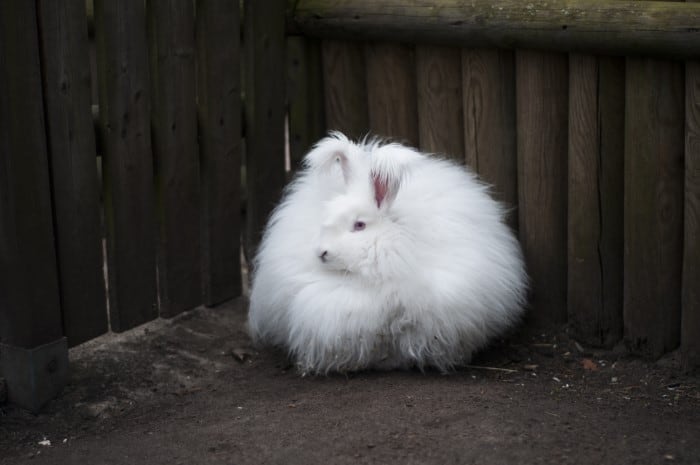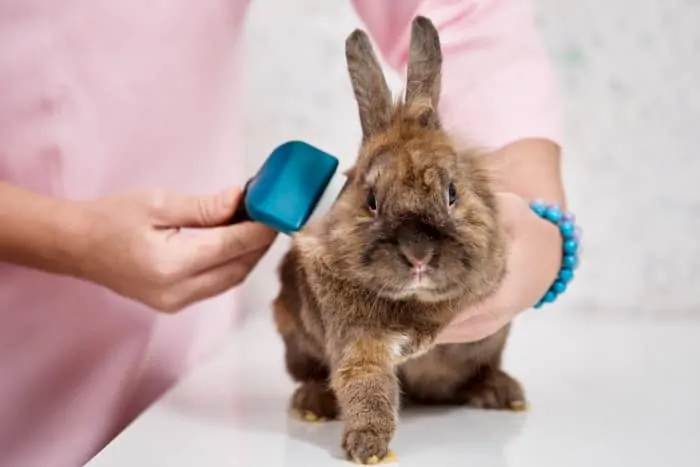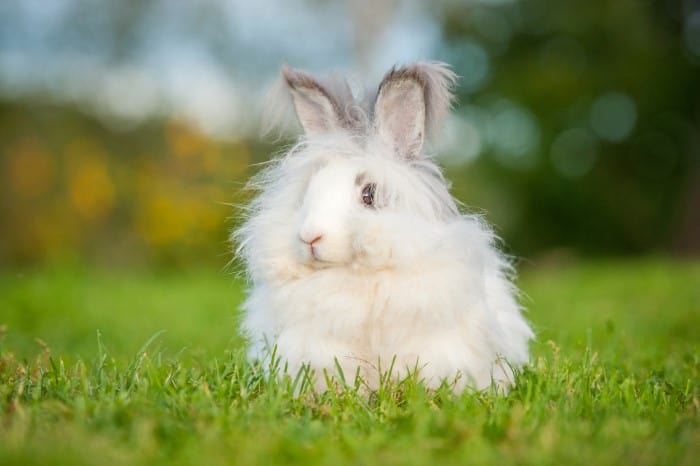We have all had to struggle with pet hair around our homes. While we love our bunnies, have you ever been curious about which bunnies shed the least? In this article, we will be exploring all the rabbits that have gained the reputation of being economical shedders. We will also share helpful tips on helping your bun keep its luxurious coat. so even if your rabbit is not on the “least shedding list”. Do not dismay. Without further ado, let’s get into it.
Which breeds of rabbits shed the least?
Angora Rabbit
The first breed that comes to mind is the Angora rabbit. These bunnies have extremely long hair. There is some history surrounding the Angora Rabbit. They were bred specifically for their hair. Naturally, there is some controversy surrounding this. The rationale was that the more hair that remained unshed, the more hair would be collected.
While Angora rabbits shed very little, their coats need fastidious care. Angoras require regular brushing since their hair is quite long. Without proper grooming, their hair can become matted. Bunnies love their grooming sessions, so it can be your special bonding time.

Rex Rabbits
You may already be aware that there are several types of Rex rabbits. So, if you are in the market for a rex rabbit, you have quite a few to choose from. We have listed them there with a brief description for ease of reference.
Astrex – These beautiful bunnies have a velvety soft coat. They make excellent pets. Its most distinct feature is its poodle-like fur. It is wavy and unique. They are medium-sized bunnies. Adults weigh between 6 and 8 pounds when they are fully grown. Their fur was once seen in the black and the more exotic blue and lilac. These rabbits are rare since they had almost all died out at the beginning of the 20th Century. Breeders are currently in the process of reviving this beautiful breed.
Mini Rex
These bunnies have a truly unusual coat. The fur sort of sticks out and does not lie flat. The guard hairs are short. The hair of a mini rex rabbit is springy to the touch and has a plush, lustrous look. This small rabbit is extremely popular and as an economical shedder, they are a huge favorite for people who keep their rabbits indoors.
Canadian Plush Lop
This curly-haired rabbit is a mixture of Astrex, Mini Rex, and the Holland Lop. They are usually blue, black, chocolate brown, and lilac. The fur is glossy and silky. These bunnies are known for their friendly, people-loving temperament.
Miniature & Standard Plush Lop
They are a combination of the Mini Lop, Holland Lop, and Mini Rex. Like its other plush cousins, its coat is curly and has a satiny feel. Miniature and Standard Plush lops come in several colors, blue, black lilac, and brown. They can also be shaded when white hairs are intermingled with the fur. As the names suggest the Miniature Plush Lop is smaller than the Standard Plush Lop. Both types of bunnies shed sparingly.
Velveteen Lop
These bunnies are a cross between the English Lop and the Mini Rex. They usually weigh between 5-7 pounds when they reach adulthood. Their coats are very shiny and smooth to the touch. They favor the coloring of the English Lops that is to say fawn, blue, opal, chinchilla, black and white, just to name a few.
When is shedding normal?
Even if you have one of the aforementioned breeds, there are times when your rabbit will shed. Your bun will shed depending on its stage of life. As rabbits mature, the rabbit’s baby coat is replaced around 5 months. This is the transitional coat. Then the adult coat comes in. So, if you see your baby bun shedding as he grows, there is nothing to be alarmed about.
Rabbits also shed according to the seasons. Rabbis generally shed their coats in spring and autumn. However, as the temperatures start to increase at the beginning of summer, rabbits will shed their winter coats for obvious reasons.
While your angora or rex rabbit will shed during these times, the amounts will be significantly less.
Can shedding be a sign of illness?
Yes, it can. If you notice that your bunnies are shedding copious amounts of hair, there may be a medical problem. If you are worried about whether or not you will be able to detect a problem, you will notice the abnormal amounts of hair. If you already have a rabbit, you will already be accustomed to what is the norm for your rabbit.
Here is a list of conditions that affect rabbits that cause excessive shedding.
Parasitic Problem
Despite your best efforts, your rabbit may have picked up a parasite. There are several parasites that can affect bunnies. They can pick up fleas, mites, lice, and even fungi. Here are the ones that you should be on the lookout for.
- Mange mites (Sarcoptes) – Symptoms of mange is a whitish crust that develops on a rabbit’s skin. It usually appears around the eyes, ears, mouth, nose, and toes. You may also notice an unpleasant smell. This condition is very uncomfortable and causes a lot of itching and extensive hair loss. A routine inspection will reveal whether your rabbit is developing mange. If mange is not treated, your rabbit may develop sores and lesions. So, a visit to the vet should be scheduled as soon as possible, if any skin irregularities are detected.
- Fur mites (Cheyletiella and Leporacus) – This condition is a lot less visible. You may see flakes on your rabbit’s fur that resemble dandruff. It causes less itching. Your rabbit’s fur will fall off in big tuffs, leaving unsightly bald patches that can be truly heartbreaking.
- Ear canker mites (Psoroptes or Chorioptes) – This is the most unpleasant mite related infection of all. It is painful, to say the least. The good news is that these infections are easily treated, and your rabbit will be back to normal with consistent treatment within a week.
- Ringworm fungus – This infection causes your rabbit’s fur to fall off leaving patches. The spot left behind is usually red and slightly irritated. The good news is your veterinarian will know the treatment that will be most effective on this type of fungus. As such do not try to treat your rabbit with medication that is formulated for humans. It may not be safe to use on rabbits.
- Fleas and lice – They be easily irradicated by a safe treatment that your veterinarian will prescribe.
Bacterial Infection
These infections usually affect rabbits during the hot humid months or in tropical climates. You should always be on the lookout for flystrike. You can eliminate the risk by keeping your rabbit dry and being vigilant. The good news is that once the infection is treated, your rabbit’s hair will regrow in the affected areas.
- Hormonal imbalance – Although this is rare in rabbits, it can cause your rabbit to shed. A blood sample from your rabbit will be able to confirm if this is the case.
What can I do to prevent my rabbit from shedding?
Even though you may have a bunny who sheds a lot, there are steps that you can take to help your rabbit shed less. Here are some tips:
Grooming
This one may seem obvious. Stepping up your grooming game may give you some control over the shedding and fastidious care may help lessen it.
Rabbits should be groomed daily with a wire slicker brush. This way your rabbit’s hair will not get matted. Having to deal with matted hair may result in further hair loss.

Proper Diet
Similar to humans, if your rabbits eat right, they will do less unnecessary shedding. Bunnies need a specific diet. They need to eat the following foods:
- Grass or Hay – This makes up 80% of their diet. It should always be readily available in their cage or hutch.
- Fruits and Vegetables – This is where your rabbit will get her vitamins and minerals for optimum health. Rabbits only need small amounts of fruits and vegetables a few times a week. These should be given as treats. Your bunnies will love them.
- Pellets – These are optional. Rabbits don’t need to have pellets every day. It is made of quality hay and infused with minerals and vitamins.
- Clean water – Always make sure that your rabbits have access to fresh water. Change the water daily.
Now that you know which bunnies shed the least, if you are about to buy a bunny, you know which breeds to explore. If you are an allergy sufferer finding a bunny that does less shedding is advisable. However, you should also take every precaution to eliminate the hair so that you stay healthy. While these breeds may shed less, there is no way to eliminate shedding altogether. If you observe that your rabbit is losing large amounts of hair and in tuffs. It may be time to call a veterinarian. This way if there is a problem it can be addressed.

